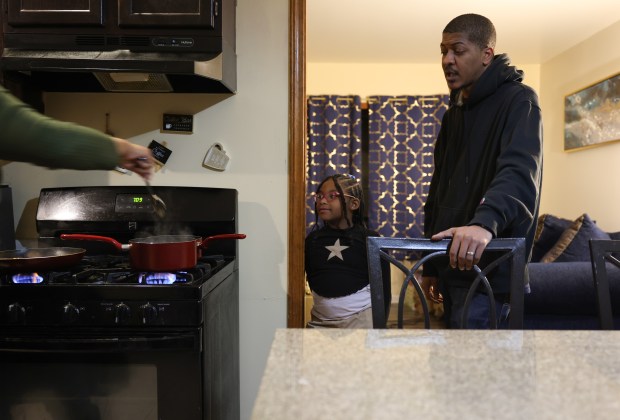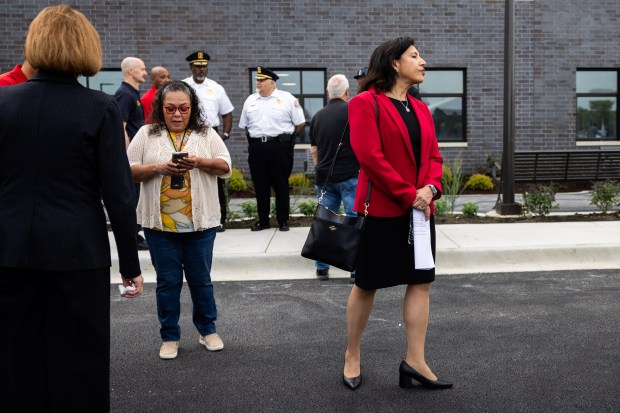Rachel Dubose had just bought a house and started a new full-time job at the Housing Authority of Cook County as a housing specialist, helping low-income county residents obtain and maintain their subsidized housing.
She made $40,000 a year at HACC in 2022.
Her bills piled up. While she never fell behind on her mortgage payments, her credit card debt was “getting too out of control,” Dubose said. She started a part-time job at Walmart. Some days she would go straight from her job at HACC to Walmart until 10 p.m., having been up since 5 a.m. It “took a toll,” she said.
Once Dubose got engaged, the dual income allowed her to stop working at Walmart. But still, after about two years, citing the high caseloads, low pay, nepotism and favoritism by managers and general “terrible work environment,” she quit.
“The fact that the (HACC office) is five to six minutes from where I reside, and I am traveling 30 to 40 minutes out to (my new job as a housing specialist) just for peace of mind speaks volumes about what type of work environment it is,” said Dubose, who was a steward for the agency’s union and worked at HACC for two years.
Dubose’s struggles to pay her bills and negative experience working for HACC mirrors that of other HACC union employees who spoke with the Tribune. The employees are working without a contract and have been for about a year. The negotiations have required the parties, who will meet Tuesday, to bring in a federal mediator to try to help reach a deal, as the union says the agency won’t agree to their current wage and health insurance proposals. Their demands include raising the salary floor to $40,000 for some workers.
They say the workloads are high and wages are low, causing many union employees to leave the housing authority, one that is deemed “troubled” by the U.S. Department of Housing and Urban Development. This designation stemmed from performance issues related to an absentee board, low-grade property inspections, incorrect reporting on leases, high outstanding balances for tenants behind on rent and a failure to submit financial reports on time.
HACC is the second largest of the 99 authorities statewide, behind the Chicago Housing Authority. It manages over 1,800 units and serves more than 30,000 people in suburban Cook County. Some of these residents who receive housing assistance through HACC may be running into issues getting in touch with agency employees because of workers’ high caseloads and staff turnover.
The agency did not make its board members or executive director available for an interview this month and instead provided a written statement about the state of union negotiations — which it also posted on its website — through its outside public relations firm.
“We want to be known as an agency that supports its employees’ professional growth through training, mentorship, and career development opportunities,” HACC’s Executive Director Danita Childers said in the statement. “I am excited to lead the change that builds a safe, healthy and equitable workplace that underscores job satisfaction and sense of fulfillment.”
After the Tribune sent its list of questions to HACC management, Childers sent an email to senior staff members at the agency saying “staff are not to speak with anyone from the media” and that they should refer any media requests to the agency’s outside public relations firm. She told these employees to “reiterate this with your respective staff.”
Sheryl Seiling, HACC’s director of rent assistance, then shared Childers’s email with her staff, which includes union workers such as housing specialists, and said: “Please be reminded that none of us speaks to anyone from the media if we get calls or emails.”
However, according to HACC’s union reps, union workers are permitted to speak with reporters as long as they do not do so as a spokesperson for the agency.
State of negotiations
The National Low Income Housing Coalition, of which HACC is a member, found that in order to afford a two-bedroom apartment in Cook County, a resident needs to make $68,560 a year. No housing specialist at HACC can afford that, according to HACC salary data from the Service Employees International Union Local 73, the group that represents HACC’s union workers.
HACC’s union workers are split into two units.
There are 23 members in the maintenance unit — workers who help maintain HACC properties — with 11 who have 10 years of service or less, according to SEIU. Their salaries range from $49,000 to $69,000 a year.
There are 77 members in the administrative/clerical unit — which primarily includes housing specialists and office assistants — 64 of whom have 10 years or less of seniority, SEIU said. Their pay ranges from $35,000 to $62,000 a year.
The union seeks to raise the salary floor for office assistants from $35,000 to $40,000 annually. All office assistants are paid $35,000 a year regardless of their seniority, SEIU said, and the most senior office assistant has worked at HACC for six years.
For housing specialists, the union wants the salary floor to go from $39,000 to $46,000 annually for members with one year of service. The average pay and seniority for a housing specialist is around $44,000 and five years, respectively.
“People need money for rent and food, and you give them a $35 ticket to Six Flags,” said SEIU Local 73 President Dian Palmer, referencing the housing authority’s recent staff trips. “That is the oldest trick in the book.”
Childers said in a November 2024 interview that when she started in her role in the fall of 2023, she recognized that some of the agency’s salaries were not in line with the current market and hired a firm to study the issue in comparison to other public housing authorities.
She said that the study found five positions, including two union roles, that are lower than HACC’s peers and said, “We need to address that.”
HACC’s union reps agreed that the agency has shown a willingness to address some pay issues.
While union workers received cost of living wage increases from 2% to 3% in the last four-year contract, HACC’s senior leadership recently received much heftier hikes on top of their already much higher salaries.
Seiling received a roughly 17% increase in her salary between January 2023 and December 2024, according to public records obtained and analyzed by the Tribune. Jon Duncan, HACC’s general counsel, received an increase of around 12.6% between the same time period, public records show. HACC said the increases predate Childers’ arrival.
HACC’s statement also said that Childers is leading the “commitment to prioritize and improve human resources” with a focus on items such as finalizing the new union contracts “with agreeable terms,” aligning employee benefits such as by “adjusting the share of healthcare costs to comparable contributions” and establishing new policies for “non-union compensation, merit increases, and cost of living adjustments.”
Cassy Williams has worked as a housing specialist at HACC for 24 years and said she has 400 to 500 clients, an amount that used to be 600 to 650 some years ago. She said in her job, she watches the housing authority approve landlords’ 20%-50% rent increases, while her income rises much more moderately. Williams said when she started at the agency, she made around $30,000 and now makes around $56,000.
She said she enjoys working at the agency, but she wants to see a pay increase. Williams went into bankruptcy last year because she could not afford her home’s maintenance costs. She said she has to ask her mother, who is on a fixed income, to help her and sometimes asks her daughter to buy her food.
“We can’t survive based on the income we are making here,” Williams said. “We work for an affordable housing agency, but your employees cannot afford housing.”
Morale is ‘very low’
Rasheeda Shannon has been a housing specialist at HACC for about a year and a half. She said she is responsible for around 350 tenants, sometimes having to go out in the field to assist residents. Some of her clients have mental health issues, including veterans with post-traumatic stress disorder, she said.
A mother of four, making $42,000 a year, Shannon said she could not afford her apartment without assistance from her parents who cover about a third of her monthly rent. She said she could qualify for housing assistance from HACC herself and sometimes drives for Uber Eats to supplement her income.
A significant pay increase would allow her to better support her family, Shannon said.
“It would help me be able to do more things with my children, my family,” she said, “and maybe perhaps move to a better area and have a better school system, which is very important to me.”
Shannon said she has considered leaving the agency but is waiting to see how the contract negotiations shake out. She said morale at work is “very low” because of the poor wages and lack of appreciation from management.
Several current and former workers, including one non-union worker, said there is nepotism and favoritism toward certain employees from managers at HACC. Most employees who spoke with the Tribune about this did not feel comfortable sharing their names as they feared workplace retaliation.
Having worked in similar roles for years, Dubose, the worker who left her job at HACC last year, said she has “never witnessed so many relatives being able to work so closely together in the same office,” with some directly managing one another.
As a part of Childers’ plans for HR, the statement said she will also focus on “requiring employee and candidate transparency regarding secondary employment, familial relationships, and/or conflicts of interest.”
The staffing issues are having a trickle-down effect on the residents that HACC serves, some say.
The Tribune spoke with HACC residents whose housing is subsidized through a housing voucher, which is used in the private rental market, who said they had issues getting in touch with agency staff in recent months and years when needing help with their housing.
Krishauna Harris said she found an apartment to use her housing voucher but then lost out on the unit because she did not hear back from HACC in time. Harris is employed in a similar line of work and said she thinks HACC needs to “hire more people and stop overworking them and give them more pay.”
Jettie Leverett said she was living in traditional public housing that was then converted to being subsidized with housing vouchers. She said she never got the paperwork she needed to move with her voucher and had to leave her unit without it because the building’s “smoky air” was exacerbating her asthma and sleep apnea. She said she is now paying more in rent for her new unit because HACC has not provided her with the paperwork she needs to obtain the subsidy at her new unit.

Donnell Dubose, Rachel’s husband who works as a HACC housing specialist, spoke at an October HACC board meeting about how he has heard from tenants who have not been able to reach someone at HACC when they need assistance. He said the high workloads are to blame, which stem from the large number of people who quit due to the low pay.
Before they got married, he lived with his parents, which he said was “the only saving grace for me” because he didn’t have to worry about household expenses.
While he works at HACC for about $42,000 a year, his wife now works for a different public housing authority in the same role for $54,000 annually.
The couple is in a better financial position thanks to their newly joint income and her increased pay, but with one of them still working at HACC, they said they are still stymied in building their future.





